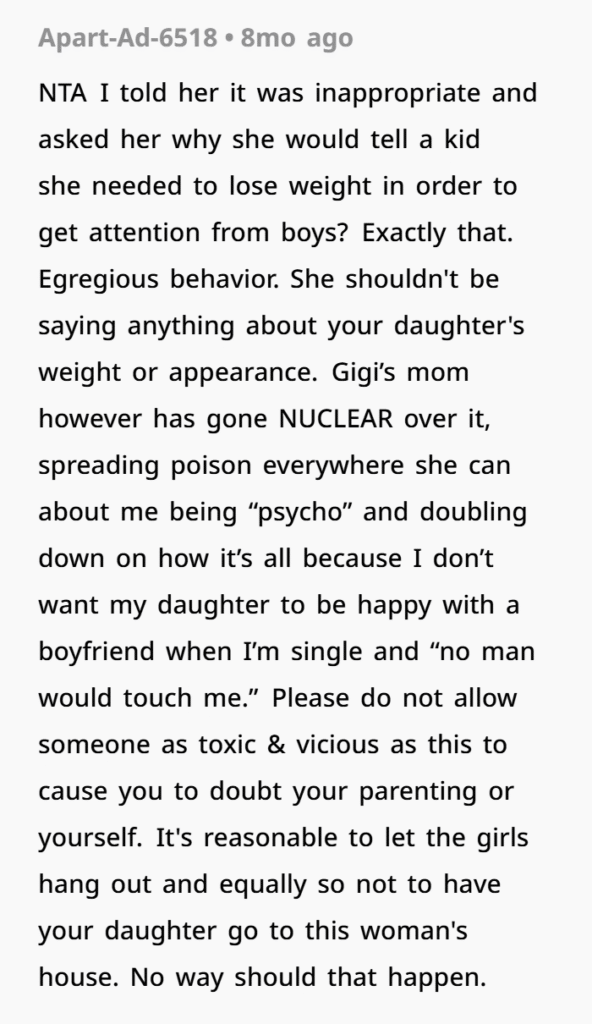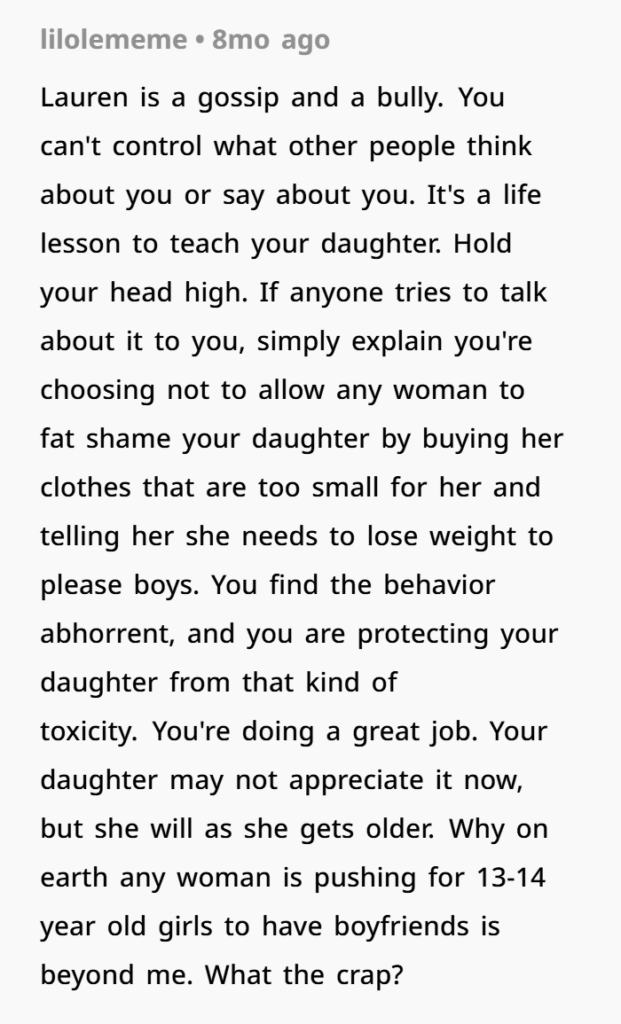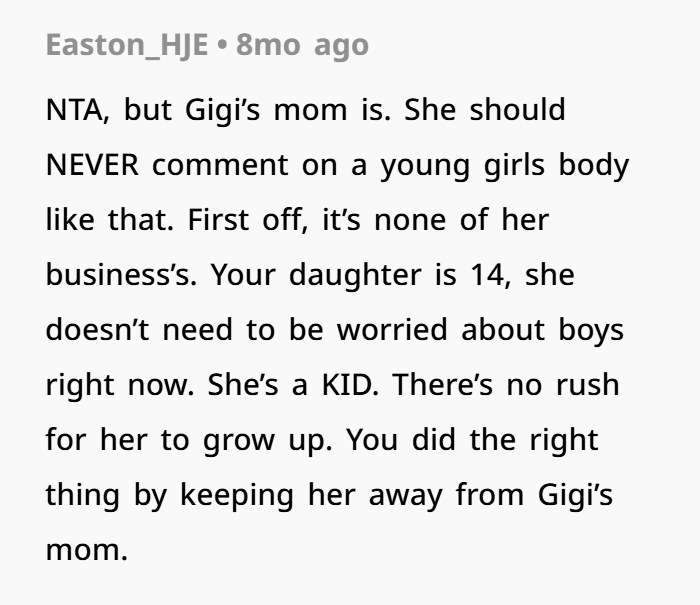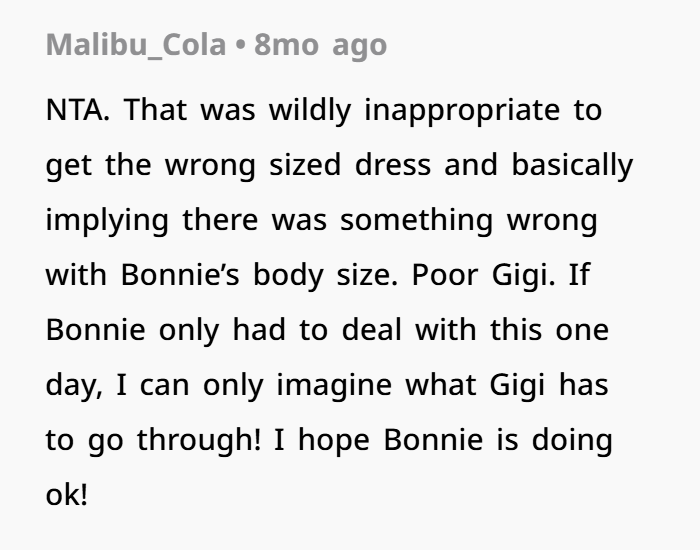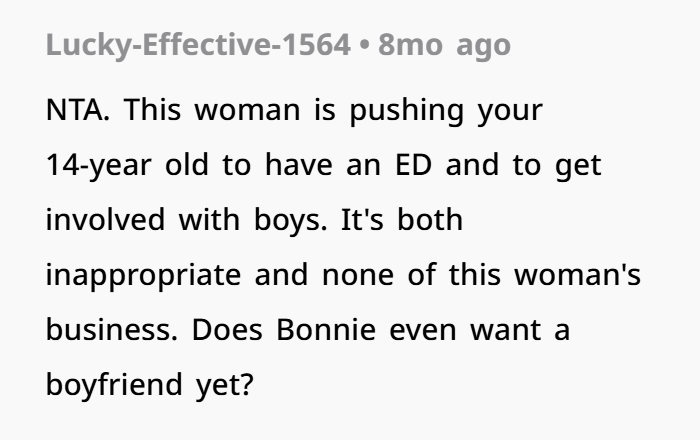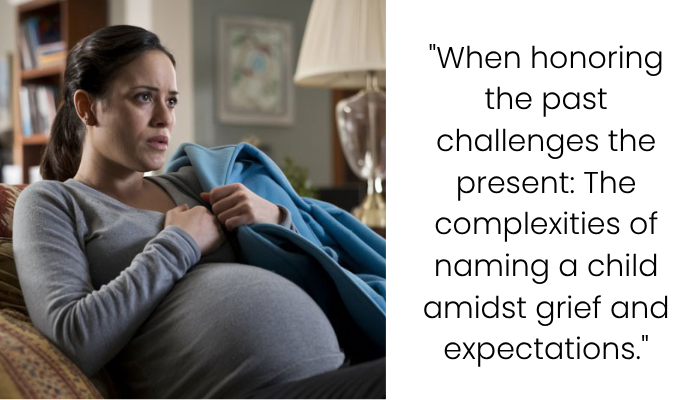AITA for Banning My Daughter from Her Friend’s House After the Mom Gave Her a Dress Two Sizes Too Small?

When a 14-year-old girl returned from a shopping trip with her best friend and the friend’s mother, her own mom was shocked to find that the woman had bought her daughter a size 3 dress—despite her daughter picking out one that actually fit. The friend’s mom claimed it was an “aspirational” piece, suggesting the teen should work toward fitting into it to attract boys. The situation escalated after a phone call, where the friend’s mother doubled down, accused the mother of holding her daughter back, and made personal insults. As a result, the mother restricted her daughter from going to the friend’s house, triggering backlash from both the other parent and mutual acquaintances. Now she’s wondering: was that overprotective, or a just boundary?
Advertisement – Continue Reading Below
Teenage years are tough enough without adults adding pressure to look or act a certain way

The author’s daughter went shopping with her best friend and her mom, only for her to be bought a dress a size smaller










1. Toxic Beauty Standards and the “Aspirational Body” Myth
The idea of an “aspirational dress” aligns with a harmful cultural narrative: that a smaller size equates to greater social value. According to the National Eating Disorders Association, exposure to weight-centric messages in adolescence—especially from authority figures—can contribute to body dissatisfaction, low self-esteem, and disordered eating . Framing a gift in terms of weight loss sets a damaging precedent, especially at a formative age.
2. Undermining Parental Authority and Autonomy
Gigi’s mother’s behavior extended beyond bad judgment—it bordered on psychological manipulation. Telling a teen that she needs to lose weight to attract boys, while also criticizing her mother for “holding her back,” directly undermines parental authority and the child’s personal autonomy.
Advertisement – Continue Reading Below

Experts in adolescent psychology, including Dr. Lisa Damour, emphasize that emotional safety is foundational to healthy teen development. When a parent-figure projects insecurity and toxic comparisons, it erodes a teen’s self-worth rather than encouraging growth .
3. The Fine Line Between “Modern Parenting” and Inappropriate Peer Pressure
Lauren framed her actions as “helping Bonnie mature,” but what she really did was impose a superficial social norm—romantic validation as a metric of worth. Her commentary on makeup, perfumes, and boy attention reflects a dangerous message: that appearance and popularity are prerequisites for happiness.
Such values clash with healthy, modern parenting which prioritizes confidence, consent, and individuality over fitting in. Bonnie’s choices—athletics, modest spending, body-positive self-care—were dismissed as inadequacies instead of respected as preferences.
Advertisement – Continue Reading Below
4. Justified Boundaries: When It’s Okay to Say ‘No More’
Setting boundaries with other adults—especially over your child’s emotional safety—is not only justifiable, it’s necessary. Parenting experts agree that you are your child’s first advocate, and keeping toxic adults at a distance is part of protecting their mental health .
The decision to pause visits to Gigi’s house wasn’t about punishing Bonnie; it was about preventing an unhealthy environment. Gigi and Bonnie are still allowed to hang out, which maintains the friendship while removing the problematic adult influence.
5. Retaliation and Smear Campaigns: What It Reveals
The aftermath—Gigi’s mom lashing out, spreading rumors, and resorting to personal insults—only reinforces how emotionally toxic she is. Her behavior isn’t just childish—it’s unhinged and potentially damaging to a community’s trust. When someone uses teenage friendship as leverage for adult conflict, it’s no longer about the kids.
Advertisement – Continue Reading Below

Lauren’s attacks on the mother’s appearance and single status are particularly telling—they’re misogynistic deflections, revealing more about her own insecurities than anything about Bonnie’s upbringing.
6. Bonnie’s Reaction: A Sign of Emotional Maturity
While Bonnie was understandably upset at the change, she didn’t defend the dress. She internalized discomfort yet didn’t voice criticism—a common coping mechanism for teens navigating adult conflict. Encouraging open dialogue and affirming Bonnie’s self-worth through validation will help ensure she understands her mother’s actions came from protection, not control.
Final Verdict: Not the A**hole
This story isn’t about a disagreement between parenting styles—it’s about a protective mother drawing a firm boundary when another adult disrespected her daughter, her parenting, and basic decency. While social dynamics may suffer temporarily, the long-term benefit is clear: Bonnie now knows that her worth is not defined by her waistline or romantic attention, but by how she carries herself—and that her mom will always have her back.
Advertisement – Continue Reading Below
This led to the author banning her daughter from going to the friend’s place, and netizens applauded her for doing so
